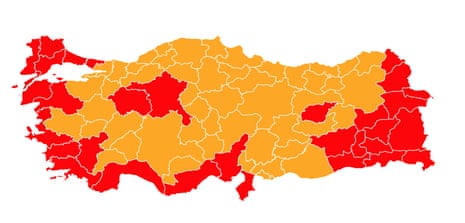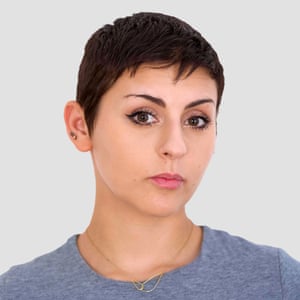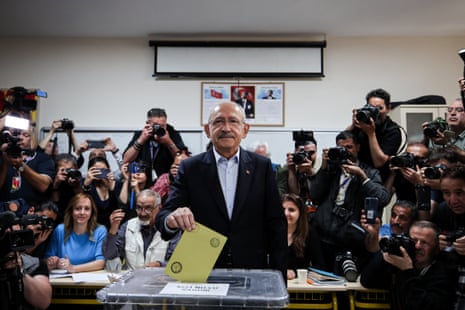Turkey election 2023 live: Recep Tayyip Erdoğan faces Kemal ...
Archie Bland and Ruth Michaelson explain why voters have returned to the polls just two weeks after the previous election.
What happened in the first vote?Parliamentary and presidential elections took place in Turkey on Sunday. In the 600-seat parliament, Erdoğan’s Justice and Development party (AKP) and its allies secured by far the most seats, 321, while the opposition won 213 and the 66 remaining seats went to a pro-Kurdish alliance.
In the presidential vote, Turkey’s Supreme Election Council had Erdoğan at 49.51% and Kılıçdaroğlu at 44.88%. A third candidate, the ultranationalist Sinan Oğan, took a vital 5.17% that appears to have kept both Kılıçdaroğlu or Erdoğan from getting over the 50% line.

While Erdoğan’s grip on the levers of power has brought Turkey close to autocracy, he has made serious economic missteps recently. He has increased his control of the theoretically independent central bank and steadfastly refused to increase interest rates despite inflation that officially touched 80% last year and which independent analysts say could, in reality, have surpassed 100%. Turkish people are far poorer and more uncertain of their futures as a result.
The government response to the devastating recent earthquake was widely viewed as inadequate. In February, Erdoğan made the tone-deaf comment that “whatever happens, happens, this is part of fate’s plan”.
However, he has outperformed expectations and appears to be further ahead than was previously predicted.
How will the runoff go?Erdoğan clearly has the advantage. But the question of which side is able to successfully spin a story about its own success – and thereby either create a sense of momentum for the opposition or stymie it – will be central. The fight over the interpretation of the vote is really a symbol of how divided the country is. It is a question of whether Kılıçdaroğlu can plausibly say: “Just a little further, we can do this.”
One question is where the votes for the ultranationalist third-place candidate, Oğan, will go. Voting for him was seen as a protest vote. It is possible his voters will be accepting of Kılıçdaroğlu because there are nationalists in his coalition.
Key events
Show key events only
Please turn on JavaScript to use this feature

Ruth Michaelson
Initial vote counts are coming in thick and fast from both the state news agency Anadolu and opposition-leaning ANKA.
Anadolu said that Erdoğan currently has 55 percent of the vote, compared to Kılıçdaroğlu with 44 percent, with 61 percent of “ballot boxes opened,” a somewhat mysterious turn of phrase that doesn’t necessarily translate as votes counted.
ANKA on the other hand has 50.99 to Kılıçdaroğlu versus 49.01 to Erdoğan with 59 percent of “ballot boxes opened.”
During the first round, both ANKA and Anadolu gave differing counts until late in the evening, leading to conflicting narratives about whether Erdoğan or the opposition were in the lead, fuelled in part by statements from leading opposition officials. Kılıçdaroğlu and several leading officials also lashed out at Anadolu, but did not provide data to evidence their claims of a lead.
The CHP have said they will speak at 19.00 local time here in Turkey, although we have already seen CHP party spokesperson Faik Öztrak has already repeated some of the same claims about Anadolu.
“We’ve seen in the past how the results were manipulated by state owned Anadolu agency, that’s why you shouldn’t leave the ballot boxes,” he told opposition supporters.
The head of Turkey’s electoral authority, Ahmet Yener, has just announced that only 25 percent of the votes have been entered into their system for the official count.
Faisal Ali
Voter turnout drops to 84% in the second round
Turkey’s election board has now lifted the broadcast ban on results from the elections. Early numbers have begun pouring in and just over half the ballots have been opened. One thing to note so far is that turnout has dropped in the second round compared to the first round. In the first round, turnout was over 88%, according to Turkey’s Anadolu Agency, but this round has seen a slight drop to 84.2% which is still remarkably high.
Faisal Ali
It is also important to keep in mind that these elections were also for Turkey’s 600-seat parliament, the shape of which is now clear. That will be the most important statistic for whoever comes out of this election on top, especially for opposition candidate Kemal Kılıçdaroğlu whose party is the second largest in Turkey’s parliament.
The AKP-led People’s Alliance – which includes the nationalist MHP – retained the largest number of deputies, even though their block shrunk from 2018’s election. They command 323 seats. Trailing them by just over a hundred deputies is the CHP-led Nation Alliance which includes another nationalist party – the Iyi party which have 212 parliamentarians in their block. The left wing Labour and Freedom Alliance which includes the pro-Kurdish Yeşil Sol party (a successor to the HDP) and the Turkish Workers party got just over 10% and have 65 deputies.
Despite the fact that Turkey switched to an executive presidential system after a 2017 referendum, the country’s parliament retains extensive powers, from the ratification of treaties, to the passing of budgets and crucially the ability to amend the constitution. One of Kılıçdaroğlu’s key campaign pledges was to revert Turkey to a parliamentary democracy which he will struggle to see through without a parliamentary majority.
Although Erdoğan won’t face significant obstacles as he can count on MPs from his alliance to approve legislation, Kılıçdaroğlu will have a bit of a tricky wicket with a hostile parliament. Even if he relies on the Labour and Freedom Alliance deputies, he will still lack the necessary majorities to enact law.
Deniz Barış Narlı
Merve Dizdar, who won the Best Actress award at the 76th Cannes Film Festival for her teacher role in Nuri Bilge Ceylan’s “About Dry Grasses” yesterday, returned to Istanbul to vote today. In the images reflected on social media, it is seen that Dizdar was applauded in the school she was voting at.
Dizdar’s award speech yesterday went viral on social media in Turkey where she dedicated her award to “all her sisters who take action to strengthen the struggle of women” and “all fighting spirits waiting to see the good days they deserve in Turkey.”
76. Cannes Film Festivali'nde 'En İyi Kadın Oyuncu Ödülü'nü alan #MerveDizdar oy kullanacağı okulda alkışlarla karşılandı
— İleri Haber (@ilerihaber) May 28, 2023
Ruth Michaelson
The mood at the polls today wasn’t quite the busy and energetic atmosphere we witnessed a couple of weeks ago during the first round, in part because today’s vote doesn’t require the electorate to fill out long ballot sheets for the parliamentary election, and maybe a little of Istanbul’s gloomy weather.
“Hopefully he’ll actually go this time,” said voter and election observer Ilhan Pekgöz, in reference to president Recep Tayyip Erdoğan.
After a bruising first round for Erdoğan’s rival Kemal Kılıçdaroğlu, whose coalition failed to win a predicted majority in parliament and who trailed the incumbent president by around five percentage points heading into the second round, few opposition supporters were feeling confident of an opposition victory.
But what stuck out most among those at the polls today was a combination of wanting to vote anyway to show their objections to Erdoğan’s policies, particularly on the economy, as well as a lingering resentment about the ballot and the fairness of the count.
The first round saw the opposition initially claim victory before accepting the results, as well as a storm of concerns about irregularities in the count that Kılıçdaroğlu’s Republican People’s Party (CHP) later said they contested.
Days later, CHP officials clarified that although they disputed the vote-count in 2,269 ballot boxes, these would not have changed the overall result.
Observers from the Organization for Security and Co-operation in Europe also said the first round was “well-managed and offered voters a choice between genuine political alternatives, but the current president and the ruling parties enjoyed an unjustified advantage.”
Despite the fairness of the vote itself, opposition supporters have often expressed discomfort with the feeling that the election has not been held in a fair context, where Erdoğan has received disproportionately more coverage in the domestic media compared to his rival and the head of a major Kurdish political party remains in prison.
“Nobody believes the first round was fair. If our votes don’t get stolen, there’s a high chance we could win,” said Pekgöz.
Polls closeDeniz Barış Narlı
Polls are just about to close here, at 17.00 local time. The announcement of the unofficial final results of the last election was delayed until the next day. This time, it is estimated that the count will end sooner, as there are only two candidates.
Turnout is expected to be decisive in the second round while both candidates repeatedly asked their followers to go voting during the runoff campaign period. In Turkey, the election turnout has been generally high in the past, reaching 88,92 percent in the first round.
Candidates especially aim to convince around 8 million voters who did not go to the polls in the previous round.
Opposition presidential candidate Kemal Kılıçdaroğlu tweeted two hours before the polls closed:
“My brothers and sisters who haven’t voted yet, go to the ballot box, don’t be lazy, vote! Your future is as close as walking distance.”
Hala oy kullanmamış kardeşim, sandığa git, üşenme, oyunu kullan. Geleceğin yürüyüş mesafesi kadar yakın...
— Kemal Kılıçdaroğlu (@kilicdarogluk) May 28, 2023Turkish opposition has been stirring up anti-immigrant sentiments in attempt to win the presidency, the Guardian’s Ruth Michaelson and Deniz Barış Narlı reports.
On the dock next to Istanbul’s Kadiköy ferry port, a large screen displays the opposition’s campaign videos on a loop, with presidential candidate Kemal Kılıçdaroğlu’s voice booming out through the speakers. Interspersed with soft rock soundtracking footage of the campaign trail are speeches where he promises to deport the roughly four million refugees currently in Turkey.
“You brought more than 10 million refugees in,” he shouts, addressing President Recep Tayyip Erdoğan, over footage of young people climbing through barbed wire and through dusty tracks next to grassland. “I hereby declare that I will send all refugees back as soon as I come to power.”
Campaigners from Kılıçdaroğlu’s Republican People’s party (CHP) hand out Turkish flags and leaflets bearing his campaign promises, including a flyer bearing the words “refugees will return home”, showing a figure scaling a wire fence at sunset.
CHP voter Çisel Onat tapped her foot to the music as she watched. “We have to do this, unfortunately,” she said of the promises to expel refugees. “I’m the kind of person who thinks everyone should just live in their own country in suitable conditions.”
While Kılıçdaroğlu and his party have branded themselves as democratic challengers to Erdoğan, their campaign before the second-round poll has focused on an anti-immigrant message in a bid to attract votes.
For more, click here:
A video of a woman taking her lamb to a polling station in Turkey has gone viral.
In the video, the lamb, clad in a a striped sweater, can be seen following the woman into the station, much to the amusement of onlookers. The woman is then seen handing in her ballot before she and the lamb head back out onto the streets.
Reuters has this report from Ankara, as voting continues:
Voting started at 8am (5am GMT) and will finish at 5pm (2pm GMT). The outcome is expected to start becoming clear by early evening local time. Polling stations were reportedly quieter in many places than two weeks ago, when turnout was 89%.
The election will decide not only who leads Turkey, a Nato-member country of 85 million, but also how it is governed, where its economy is headed after its currency plunged to one-tenth of its value against the dollar in a decade, and the shape of its foreign policy, which has seen Turkey anger the West by cultivating ties with Russia and Gulf states.
Erdogan supporters gathered at a school near his home on the Asian side of Istanbul where he voted around midday, before shaking hands and talking with the crowd.
“With God’s permission he will win. The country has many problems but if anyone can solve them, he can,” said Nuran, who came to vote with her three-year-old daughter.
In Ankara, 32-year-old Gulcan Demiroz said she hoped the vote would bring change and that her friends would otherwise go abroad, as she was considering doing, for a better life.
“This country deserves better. We need a collective of minds, not a powerful, cold, distant man who rules single handedly,” said Gulcan, who works in the textile industry, after voting for Kılıçdaroğlu.
Kılıçdaroğlu, 74, voted in Ankara. He is the candidate of a six-party opposition alliance, and leads the Republican People’s Party (CHP) created by Turkey’s founder Mustafa Kemal Ataturk. His camp has struggled to regain momentum after trailing Erdogan in the first round.

Incumbent president Recep Tayyip Erdoğan was pictured handing out money – banknotes worth 200 lira (£8) – at the polling station where he cast his ballot today.
Archie Bland and Ruth Michaelson explain why voters have returned to the polls just two weeks after the previous election.
What happened in the first vote?Parliamentary and presidential elections took place in Turkey on Sunday. In the 600-seat parliament, Erdoğan’s Justice and Development party (AKP) and its allies secured by far the most seats, 321, while the opposition won 213 and the 66 remaining seats went to a pro-Kurdish alliance.
In the presidential vote, Turkey’s Supreme Election Council had Erdoğan at 49.51% and Kılıçdaroğlu at 44.88%. A third candidate, the ultranationalist Sinan Oğan, took a vital 5.17% that appears to have kept both Kılıçdaroğlu or Erdoğan from getting over the 50% line.

While Erdoğan’s grip on the levers of power has brought Turkey close to autocracy, he has made serious economic missteps recently. He has increased his control of the theoretically independent central bank and steadfastly refused to increase interest rates despite inflation that officially touched 80% last year and which independent analysts say could, in reality, have surpassed 100%. Turkish people are far poorer and more uncertain of their futures as a result.
The government response to the devastating recent earthquake was widely viewed as inadequate. In February, Erdoğan made the tone-deaf comment that “whatever happens, happens, this is part of fate’s plan”.
However, he has outperformed expectations and appears to be further ahead than was previously predicted.
How will the runoff go?Erdoğan clearly has the advantage. But the question of which side is able to successfully spin a story about its own success – and thereby either create a sense of momentum for the opposition or stymie it – will be central. The fight over the interpretation of the vote is really a symbol of how divided the country is. It is a question of whether Kılıçdaroğlu can plausibly say: “Just a little further, we can do this.”
One question is where the votes for the ultranationalist third-place candidate, Oğan, will go. Voting for him was seen as a protest vote. It is possible his voters will be accepting of Kılıçdaroğlu because there are nationalists in his coalition.
Voters go to the polls again in TurkeyThe second round of voting in the Turkish presidential election is under way, as my colleagues Ruth Michaelson and Deniz Barış Narlı report from Istanbul:
Turkish voters are heading back to the polls for an unprecedented second round of a presidential election in which Recep Tayyip Erdoğan hopes to see off a faltering challenge from rival Kemal Kılıçdaroğlu.
In the first round earlier this month, Erdoğan upended expectations and many pollsters’ predictions by coming out ahead with 49.5% of the vote, forcing his rival into second place with 44.5%. A further upset occurred in the parliamentary vote, where Erdoğan’s coalition won a comfortable majority.
Kılıçdaroğlu has offered voters a chance to end Erdoğan’s two decades in power and to prevent Turkey’s longest-serving leader from extending his rule into a third decade.
Both candidates have sought to harness support from voters who opted for the third-place presidential candidate, the ultranationalist Sinan Oğan of the Victory party, who obtained roughly 5% of the presidential vote in the first round.
We will be covering all the developments in the live blog ahead of polls closing at 5pm in Turkey (3pm BST, 10am EDT) and an expected result at around midnight local time.
















































